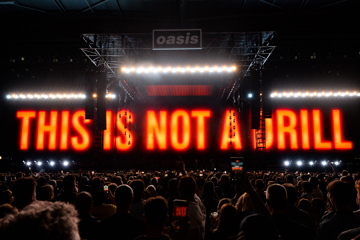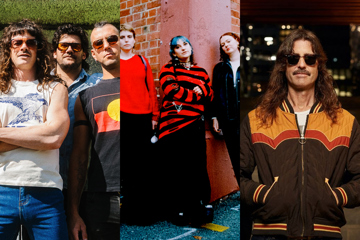Shamir Has "No Gender, No Sexuality, And No Fucks To Give"
"We were just doing little side projects. Mine happened to be Shamir and, obviously as you can see, it just kinda took a life of its own!"

Shamir Bailey, possessing a supple countertenor, even speaks in a sing-songy voice. The 21 year old is headlining Laneway on the back of his (ambiguously) celebratory debut, Ratchet. "I'm super excited," Bailey announces. He says "super" a lot. Bailey also reveals a sense of the absurd. Halfway through the phone call, Bailey's line erupts into hideous white noise — it sounds like a UFO is hovering over him. "Oh, my god!," he shrills. It's actually a military aircraft flying scarily close. Bailey hasn't been abducted by aliens. "I'm still here," he giggles.
Bailey grew up opposite a pig farm in Northtown, a surreal suburb located between the glitzy gamblers' resort of Vegas and the barren Mojave Desert. Curiously, it's in range of Area 51 — that secret US base where conspiracy theorists believe extraterrestrial life is investigated. Bailey was raised by a young bohemian single mother (working in real estate) and his aunt, Mila Bailey. Mila wrote songs. She set up a home studio — "before it was even more accessible — she put a lot of time and money into it" — and she invited in local musicians. At nine, Bailey, inspired, was given an acoustic guitar by his mum. He taught himself to play country songs, albeit unconventionally. Bailey entered country talent comps, only to be advised that he should study Taylor Swift, which he'd shake off.
Don't miss a beat with our FREE daily newsletter
Incongruously, Bailey, his family members of the Nation Of Islam, attended "a Mormon-ran high school" — it was "very basic". "Everyone was kinda just like the same and white bread and white picket and cut copy." Bailey, eccentric, flamboyant and individualistic "stood out like a sore thumb". Though he charmed his school mates and was popular, he felt his "weirdness" was a novelty to them. Instead he found personal — and spiritual — validation in music. Massively into The Slits and Vivian Girls, Bailey developed a promising "twee" punk combo with Christina Thompson transgressively called Anorexia. What happened? "'Shamir' happened," Bailey laughs. "Anorexia was very active about three years ago. We had a few months' hiatus while we were working and we had to graduate from high school and everything. So we were just taking a break before we started a new project or something. But, in between time, we were just doing little side projects. Mine happened to be Shamir and, obviously as you can see, it just kinda took a life of its own!"
"Everyone was kinda just like the same and white bread and white picket and cut copy."
Bailey, enamoured of countercultural pop acts like Marina & The Diamonds, began "experimenting" with a Dr Groove drum machine that was bequeathed to him. He submitted his demos to the New York indie GODMODE, run by Nick Sylvester — a onetime Pitchfork contributor — after discovering its noise band YVETTE. "I had no idea who I was hitting up," Bailey admits. Sylvester, amped, sought to produce the unassuming Nevadian. "I was flipping out because I produced all my stuff in my bedroom up to that point, but it was because I was the only producer that I trusted — in Vegas, at least," Bailey quips. "It was completely out of necessity. So the fact that he was offering his production service... I was super-down."
Sylvester had been struck by Bailey's apparent affinity with classic house, imagining him as "an R&B Yeezus". But Bailey now attributes his "vintage sound" to Dr Groove. "I was not familiar with house music at all, and I'm still very, like, at basic-level knowledge when it comes to house music," he confesses. "I just knew that I wanted to do something different than the super-overly produced, hi-fi-sounding electronic music that I was hearing around me on the radio and on The Strip in Vegas... I just wanted to make more minimal electronic music — and it just happened to sound like old-school house music. When I presented it to Nick, he was like, 'Oh, you must listen to so much house music.' I was like, 'What is house music? I mean, I've heard of it, but I really don't even know the components.' Then it just turns out that Nick already had such a huge love and knack for house music. He just completely schooled me on this old-school house, and electronic and disco music."
Mid-2014 Bailey unveiled the Northtown EP, cut with Sylvester in Brooklyn. The hipster fave subsequently confirmed he'd signed a deal with the UK's XL Recordings (home to Adele and FKA Twigs), airing the hip-house single On The Regular, akin to Azealia Banks rapping with ESG. Bailey chucked in his job at Topshop in Vegas. ("I absolutely loved working at Topshop," he effuses, when probed for horror chain-store tales.)
"To those who keep asking, I have no gender, no sexuality, and no fucks to give."
Bailey's sanguine debut Ratchet — its title urban slang for 'diva' — traverses '80s house, from Frankie Knuckles' pure strain to acid, to '90s crossover diva house (more Ultra Nate than Robin S) through to DFA Records' '00s disco-punk. Bailey summarises his musical relationship with Sylvester as "very back and forth". However, he had another eager collaborator — Auntie Mila was pushing to co-write. Initially, Bailey was resistant. "I kinda wanted to do it all myself," he says. Yet Mila convinced him. "Nick sent me an early demo of [the song] Vegas and my aunt heard me playing it and she was like, 'Shamir, I really love this track - let me write to it'. I was like, 'Okay, whatever.' I was like, 'I'll see what she can do,' but I was super-prepared to reject it anyway. [But] she sent me back the demo of the lyrics and I was like, 'Okay, this is really good!'" Vegas is a twisted tribute to Sin City.
Now that Bailey has lived in New York, and travelled, he's unsure about returning to tedious Northtown. "I have no roots right now, I'm just touring non-stop," he says. "I'm still trying to think about if I wanna go back or if I wanna chill somewhere else, so I don't know. I'll have to wait until I'm done touring, but that won't be for, like, forever."
Ratchet received glowing reviews, yet the media is especially intrigued by Bailey's cultural fluidity. He's no 'EDM' artist, but nor is he 'urban' or 'indie'. Ratchet's ballad Darker is gospelly. In fact, Bailey considers genre "a confine". "I listen to so many types of music and I just want to find a way to express that in my own music as much as possible," he says. Bailey has no qualms about being designated 'pop', "because pop music just has to be relatable, it doesn't necessarily need to fit inside of a genre". And he perceives his gender identity in the same amorphous way.
The New York Times' Wesley Morris proclaimed 2015 "The Year We Obsessed Over Identity" — racial, gender, sexual — with Caitlyn Jenner becoming the world's most famous transgender person and, contentiously, civil rights activist Rachel Dolezal declaring herself to be "transracial". The androgynous Bailey looms as a zeitgeist popstar. He's mentioned along with openly gay Riot Boi rapper Le1f or Mykki Blanco, but you could throw in OG gender-benders (and genre-benders) like David Bowie, Prince or Annie Lennox. Nevertheless, Bailey isn't into labels, not even 'post-queer', 'post-gender', 'post-cisnormativity'... A tweet from last March says it all: "To those who keep asking, I have no gender, no sexuality, and no fucks to give." Still, this transcendent anomaly doesn't mind that his identity is "a conversational topic" — it'll liberate others. "It's just perfect timing," Bailey says of his success.
At Laneway, the mercurial performer will be accompanied by his band: a keyboardist, drummer and (female) back-up vocalist. Known to hug punters, Bailey approaches his show as "a party" and "a shared experience". "It's not necessarily like, 'Hi, I'm Shamir — all eyes on me, watch me." But you will.







